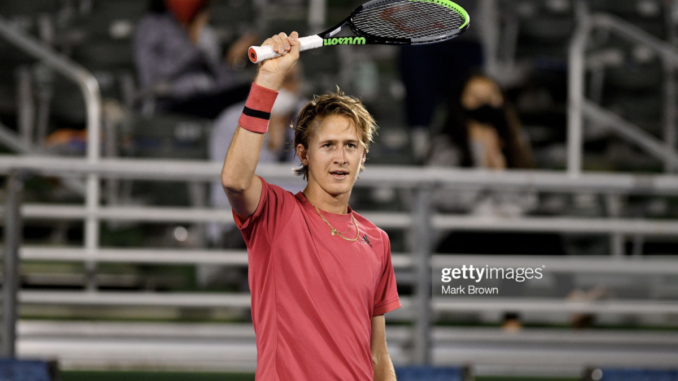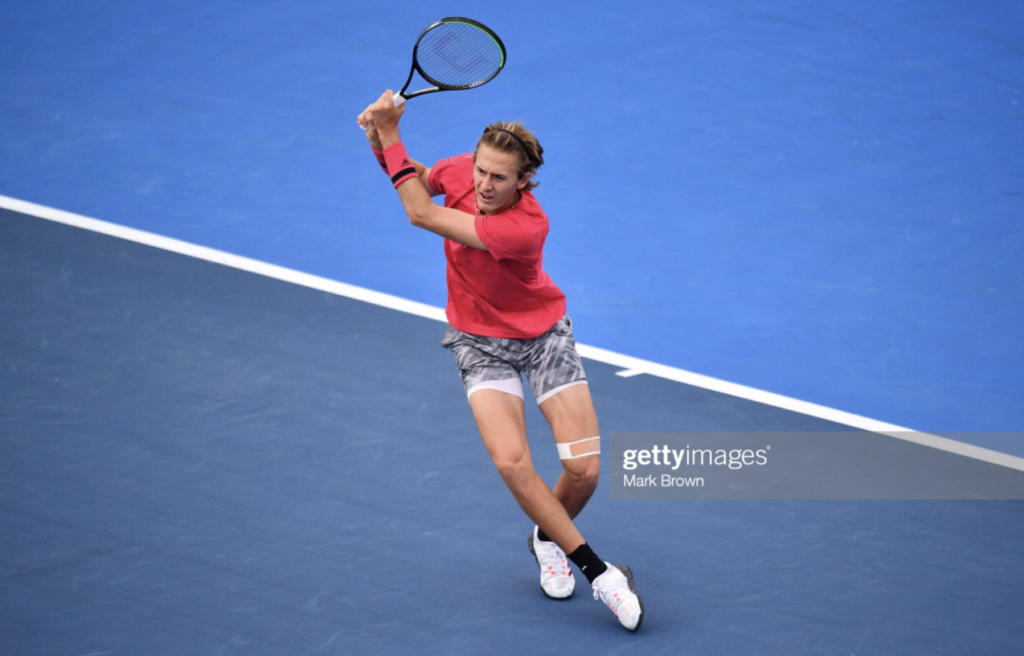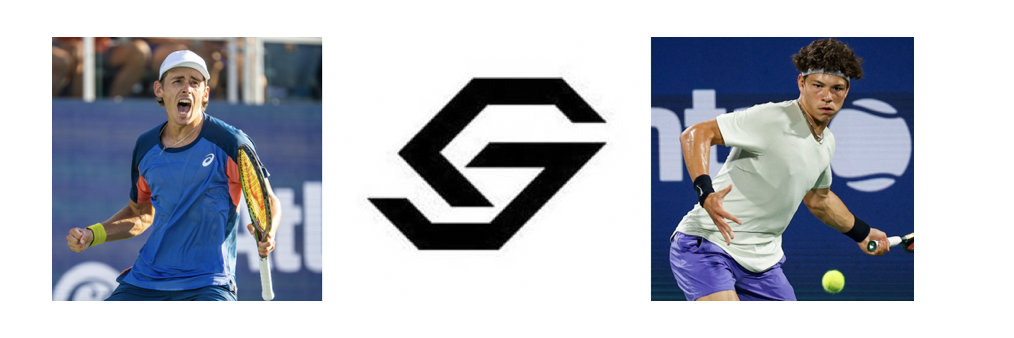
With his triumph at the Quimper Challenger this past weekend, Sebastian Korda broke into the Top 100 for the first time on Monday.
In all likelihood he will be part of it for a long, long time.
For the first time since Andy Roddick was emerging as the United States’ next great player in the early 2000s as the careers of Pete Sampras and Andre Agassi were winding down, an American has a real chance to live up the hype. Donald Young? He should have been better than he turned out to be after being hailed as the USA’s heir apparent to Roddick in the late 2000s, but given his stature he was never going to have the firepower necessary to be elite in the current game. Ryan Harrison? He became a household name when he won an ATP-level match at 15 years old (defeated Pablo Cuevas in the 2008 Houston first round), but at that point in time he obviously hadn’t sustained any success that otherwise would have made him all the rage. Fast forward 13 years and Harrison still hasn’t sustained any success! Jack Sock? Jared Donaldson? Taylor Fritz? Frances Tiafoe? All were decent talents as teenagers; but none ever inspired the same optimism as Young and Harrison; none ever had slam-winning potential.
Korda, however, has both the hype and the ingredients to fulfill it.
Expectations have climbed dramatically thanks mostly to a breakout 2020 campaign. Yes, you had to be very good in a very short amount of time to have a “breakout” anything in 2020, but Korda managed to do it (count Andrey Rublev in that group, as well). He qualified for the Cincinnati Masters, qualified for the French Open and made an improbable run to the fourth round (lost to eventual champion Rafael Nadal), and wrapped up the season with his first professional title at the Eckental Challenger. Pomp and circumstance surrounding the 20-year-old has only ratcheted up a notch with his first ATP final in Delray Beach (lost to Hubert Hurkacz) and the Quimper trophy.
Unlike his aforementioned compatriots, Korda can–and will–take the next step…and the next one…and the next one after that.
First and foremost, the Bradenton, Fla. native has the perfect build for the current era of men’s tennis at 6’5” and 170 pounds. Okay, the 170 may be a bit light for 6’5”–but that just means he has plenty of room for improvement by hitting the local weight room. He already moves extremely well for a big guy, too. Additionally, Korda wields a backhand that is only the stuff of unattainable dreams for most Americans. Harrison, Sock, John Isner, Steve Johnson, and Reilly Opelka would pay six-figures to have anything like Korda’s backhand. Heck, basically any American man in the last 30 years other than Jim Courier and Mardy Fish would kill for Korda’s two-hander.

Perhaps even more importantly, all signs would suggest that Korda has something else.
Intangibles.
You know, those things that separate the great from merely the very good.
Korda is the son of Petr Korda, who won the 1998 Australian Open and reached No. 2 in the world. Petr’s wife and Sebastian’s mom is Regina Rajchrtová (now Kordová), who was as high as No. 26 on the WTA Tour. Obviously having professional athletes for parents doesn’t guarantee future stardom, but it certainly doesn’t hurt. Just ask all of the Korda children! Sebastian’s sisters are both professional golfers with notable success on the LPGA Tour. Jessica, 27, has six professional titles and five top-10 finishes in majors; Nelly, 22, has five titles and four top-10 finishes in majors (including two in the top three with one runner-up). The Korda kids are flat-out champions, both present and future.
Sebastian actually has a major title already under his belt (of the junior variety). As a 17-year-old, he won the Australian Open junior boys tournament. Like father like son, as they say (and daughter, for that matter!).

But if there is one person Korda wants to be like even more than pops, it’s none other than Nadal.
Sure, a bunch of players Korda’s age idolized Nadal (or perhaps “idolize” present tense would be more accurate!). But it’s interesting that Nadal is the one Korda hero-worships because their game-styles are nothing alike. He doesn’t want to–and can’t–tactically play like the 20-time major winner. But he can–with a lot of work, of course–compete like him.
“He’s my biggest idol,” Korda said before their fourth-round match at Roland Garros. “The way that he is, everything that he does is perfect. Ever since I was kid I was just over the moon watching him play. He’s one of the reasons I play tennis. Just watching him play…unbelievable competitor; from him I have the never-give-up mentality. Whenever I’m on court, I try to be like him.”
After receiving a free 6-1, 6-1, 6-2 lesson, Korda asked Nadal for his autograph and Nadal of course obliged. The world No. 2 even signed one of his Nike shirts that he wore during this tournament.

“To my friends Sebastian all the very best in your tennis career,” Nadal wrote.
“Best moment of my life,” Korda posted on Instagram.
And ever since that moment, it has been full steam ahead: quarterfinals of the Ismaning Challenger, title at the Eckental Challenger, runner-up in Delray Beach, title at the Quimper Challenger. For those counting, that means he is 14-1 in his last 15 matches. He is also 22-3 in his last 25 matches dating back to French Open qualifying.
The results, the natural talent, and the intangibles all suggest greatness is the cards. Will Korda ever catch his idol Nadal? Of course not. Can he catch and even surpass his dad? Now that is possible.
Said the elder Korda in an interview last summer, “Everybody is always asking [Sebastian]: ‘Are you the son of Petr Korda?’ Which I would love to change in the future, so that people ask me, ‘Are you Sebastian’s father?'”
Petr may be getting asked that question a lot sooner than he thinks.


I completely agree. He is the real deal, and probably the first time in a good decade that American men’s tennis has had a bone fide star-in-the-making. No offense to either Sam Querrey and John Isner, but those intangibles you spoke of just aren’t there.
Korda has the game, but he also has something equally important–charisma and the ability to get people to talk about him. I guarantee that the ATP is salivating over the prospect of Korda as we speak. The U.S. is a juicy market that has been largely disinterested since the Agassi-Sampras days. Korda is just the fellow to get some of it back.
Great article, Rick, and I loved reading about Seb and his talented family, and I agree with Cheryl (above) in that he has the charisma to keep the fans and press in his corner.